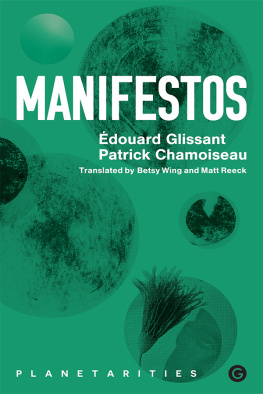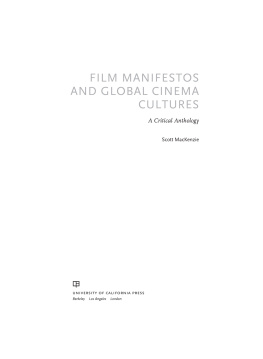Guide
Manifestos
Planetarities
A short book series that investigates planetary troubles and proposes transformative approaches to planetary research and practice.
Manifestos
douard Glissant
Patrick Chamoiseau
Translated by
Betsy Wing and Matt Reeck

Copyright 2022 Goldsmiths Press
First published in 2022 by Goldsmiths Press
Goldsmiths, University of London, New Cross, London SE14 6NW
Printed and bound by Versa Press, USA
Distribution by the MIT Press
Cambridge, Massachusetts, USA and London, England
Originally published in French as Manifestes Editions La Dcouverte, Paris, 2021
Original (French) text copyright 2022 douard Glissant and Patrick Chamoiseau
Translation (English) copyright 2022 Elizabeth Wing and Matthew Reeck
The right of douard Glissant and Patrick Chamoiseau to be identified as the authors of this work has been asserted by them in accordance with sections 77 and 78 in the Copyright, Designs and Patents Act 1988.
Every effort has been made to trace copyright holders and to obtain their permission for the use of copyright material. The publisher apologizes for any errors or omissions and would be grateful if notified of any corrections that should be incorporated in future reprints or editions of this book.
All Rights Reserved. No part of this publication may be reproduced, distributed or transmitted in any form or by any means whatsoever without prior written permission of the publisher, except in the case of brief quotations in critical articles and review and certain non-commercial uses permitted by copyright law.
A CIP record for this book is available from the British Library
This publication is a deliverable of The Seed Box program, which is funded by MISTRA The Swedish Foundation For Strategic Environmental Research and Formas a Swedish Research Council for Sustainable Development.
ISBN 978-1-913380-54-0 (pbk)
ISBN 978-1-913380-53-3 (ebk)
www.gold.ac.uk/goldsmiths-press

d_r1
Contents
by Jennifer Gabrys, Ros Gray, and Shela Sheikh
Foreword by Patrick Chamoiseau
Afterword by Edwy Plenel
By Jennifer Gabrys, Ros Gray, and Shela Sheikh
With multiple environmental crises erupting worldwide, the planetary has become a common topic. Yet while studies proliferate that speculate about the state of the planet or propose governance on a planetary scale, they often reinscribe dominant voices, knowledges, and ways of being. The Planetarities series seeks to unsettle prevailing engagements with the planetary by supporting work that grapples with the power dynamics, indeterminate relations, and poetic possibilities of eco-social transformations. Drawing on, extending, and reworking Gayatri Chakravorty Spivaks notion of planetarity, the series takes up distinct types of planet-thought and planet-feeling. For Spivak, planetarity was a concept that could undo the abstractions of globalism while expanding beyond isolated consolidations of self or identity. With planetarities, this series further embraces the pluralistic concepts and practices that offer different connections and collectives tied to the planet.
As a series, Planetarities creates a space for work from writers and practitioners within and beyond Western and institutional contexts, with contributions from the Global South, Indigenous communities, and environmental activists working within transdisciplinary and transnational movements. This series seeks to advance theoretical and practice-based work as a plural and diverse collective project that shares a sense of urgency about planetary troubles. The texts in this series attend to planetary inhabitations and problems, from climate migration and environmental justice to multispecies world-building and the geopolitics of extraction. By considering how the planetary is at once summoned and unsettled through ecological and socio-political crises, the series poses a challenge to Anthropocene discourse by decentering the Anthropos and instead exploring how the planetary undoes and remakes humans and nonhumans as planetary subjects.
Manifestos, the first volume in the Planetarities series, presents just such a provocation and contribution to expanded planetary thought and practice. A translated collection of multi-authored manifestos and op-eds led by French-Martinican authors douard Glissant and Patrick Chamoiseau, Manifestos writes toward whole-world [tout-monde] relations from the perspective of what the authors name small countries with big projects. The texts cover topics ranging from Guadeloupe, French Guiana and Martiniques relationship with colonial France to Hurricane Deans impact in the Caribbean, Obamas presidency, and the necessity of poetics for any whole-world project. Together, they suggest how to confront and transform the challenges of colonialism, national identity, climate disaster, economic inequality, and environmental pollution not as separate events but as interconnected conditions. For the authors, the wholeness of the world poses the challenge of addressing embroiled circumstances of abundance and want, reciprocity and justice, migration and flourishing. Connection is the baseline of being in the world. It is only by being in exchange with others whether human, animal, or vegetal that the whole world and its possibilities become possible as a dream and ongoing project. Since this is a poetic project, moreover, it requires beauty for its implementation. As Glissant and Chamoiseau write, The Whole-World is sensitive to the warmth of utopia, the oxygen of a dream, the beautiful errantry of a poetics. It appoints art, and what art can divine, to rule over our global politics and the words we share. This is a planetary imagining written far from the gaze of a colonial globalism but close to the nerve center of pluralistic planetarities.
As a collection of short titles that tackle key topics of planetary relevance, the Planetarities series finds a supportive and like-minded community with Goldsmiths Press, which advances rigorous, experimental, and radical engagements with theory and practice. At Goldsmiths Press, we extend our sincerest thanks to Sarah Kember for her enduring support of the Planetarities series, and Ellen Parnavelas and Susan Kelly for contributing to the development and publication of the Manifestos text. In addition, we thank the original French-language publisher, La Dcouverte, for granting permission to undertake this translation. Betsy Wing and Matt Reeck created an impressive translation of the original Manifestes, and we are grateful to these translators for their excellent composition. Finally, this first volume of the Planetarities series benefited from generous support from The Seed Box program, funded by MISTRA The Swedish Foundation for Strategic Environmental Research and Formas a Swedish Research Council for Sustainable Development. Contributions from The Seed Box members, including Astrida Neimanis, Bjrn Penrud, Cecilia sberg, Jesper Olsson, Katja Aglert and in particular Matthew Fuller, have helped to make this publication possible.
We cant let this go unchallenged!
douard Glissants capacity for indignation was true to the power of his poetics of being, on the same scale, relevant and vigilant. Relevant because it was unfailingly useful every day, called in some mysterious way toward the state of the world or one of the convulsions of the country of Martinique. Vigilant because, being both broad and deep, it brought a sensitive awareness to those always troubled areas of reality where both monsters and miracles occur.











